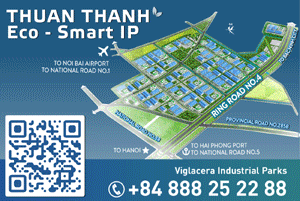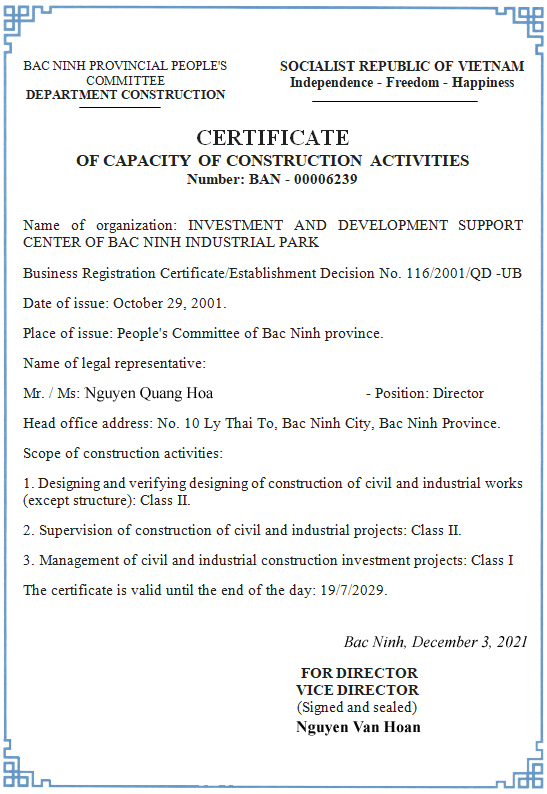Chairwoman
of the Provincial People’s Committee Nguyen Huong Giang summarized: At the time
of re-establishment, Bac Ninh was a purely agricultural province, with low
economic and social starting points. Since the issuance of the Resolution 54
and Conclusion No. 13 of the Politburo, the province has actively coordinated
with the ministries, branches and localities in the Red River Delta region to
organize the implementation of tasks and solutions in order to successfully
achieve the common goal. Up to now, Bac Ninh has basically been an industrial
province in the direction of modernity, many socio-economic targets are in the
group of leading provinces and cities nationwide: The average economic growth
rate in the period 2005-2019 reached 14.7%/year; in the period 2005-2020
reached 13.95%/year; In 2021, the scale of GRDP increased to VND 133.6
trillion, accounting for 2.71% of the whole country’s GDP and ranked 8th out of
63 provinces and cities and 4th in the Red River Delta. The budget revenue in
the area increased sharply, reached VND 33,227 billion by 2021, more than 19
times higher than in 2005; is one of 14 provinces and cities that completed the
construction of new rural areas... Bac Ninh has become the growth pole of the
Northern key economic region, the Capital region, made important contributions
to the overall growth of the whole country, become a bright spot in the whole
country’s economic development. The technical infrastructure has been enhanced,
and the culture - society has obtained a lot of important results. The people’s
material and spiritual life is improved, the national defense is consolidated,
the security, political, social order and safety are maintained; the internal
affairs, anti-corruption and waste prevention have positive changes. The Party
and government building work have been strengthened, the political system has
been consolidated, and the people’s confidence has been enhanced.
Along
with the obtained results, the implementation of the Resolution still has some
limitations that need to be overcome, those are, the growth quality and
efficiency is still unstable, the economy depends on the FDI sector and export
of the electronics industry; The domestic auxiliary industry is small in scale
and has weak competitiveness. The service and trade sectors have not made a
breakthrough to increase the density, and there are no new factors to break
through. The progress of implementing the large and pervasive projects is still
slow. The investment in building the cultural, sport institutions, schools, and
amusement parks for employees is still asynchronous and small in scale. The
high-quality human resources, knowledge content, responsive technology,
professional and modern working skills are still lacking. The management of the
quantity of employees from other provinces and foreigners in the province faces
many difficulties...

The industry-construction sector accounts for 77.3% of the economic structure
Continuing
to affirm the region’s growth pole position, in order to improve the quality,
efficiency and sustainability of the economy, the Resolution of the 20th
Provincial Party Congress for the 2020-2025 term sets out the following
objectives: by 2030, build Bac Ninh as a city with a modern and high-tech
industry; one of the centers of trade-service, education, human resource
training, health care, research, application and development of science and
technology, meeting the requirements of the city directly under the Central
government; is the driving force of development of the Northern key economic
region, the Capital region and the whole country. Strive for the average growth
rate in the period 2021 - 2025 from 7-8%/year; by 2025, the industry and
construction density will be 74.5%, service 23.9%, agriculture, forestry and
fishery to 1.6%; GRDP per capita is USD 8,900 (current price); the social labor
productivity increases from 8.5-9%/year; the budget revenue reaches VND 37,400
billion; the poor household rate is reduced to less than 1%...Vision to 2045,
Bac Ninh is a smart, high-tech industrial city.
At
the meetings with the Steering Committee to summarize the Resolution 54, the
Standing Deputy Secretary of the Provincial Party Committee, Chairman of the
Provincial People’s Council Nguyen Quoc Chung assessed: To fulfill the above
objective, Bac Ninh proposed the solutions on socio-economic development
planning, in which striving to complete the Bac Ninh Provincial Planning for
the period 2021-2030, with a vision to 2050, and to adjust the General Planning
of Bac Ninh city to 2035, with a vision to 2050. For change in the economic
structure of the locality, focusing on developing industry, agriculture,
forestry, fishery, service industries with high added value associated with the
urban economic development. Developing the socio-economic infrastructure of the
locality, focusing on building a synchronous technical and social
infrastructure system, attaching special importance to investment in modern
digital infrastructure. Promote linkages between the localities in the Northern
key economic region and the Capital region, as a bridge between Hanoi and the
Northern mountainous provinces. Effectively manage the public investment,
promote the financing and banking activities, meet the capital sources for
development. Promote the cultural character and people of Bac Ninh - Kinh Bac,
create a driving force for development in the new period. Strengthen investment
in building the cultural and sport institutions. Continue to innovate
fundamentally and comprehensively the education and training to meet the
requirements for improving high-quality and integrated human resources;
intensify the environmental protection and respond to climate changes... Bac
Ninh proposes the Politburo, National Assembly, Government and central
ministries and branches to issue a Resolution on socio-economic development and
national defense and security assurance in the Red River Delta region to 2030,
with a vision to 2045 as a development orientation for the provinces in the
region; provide the policy of building Bac Ninh province into a city directly
under the Central government; remove difficulties and obstacles in the legal
regulations on Planning, construction, investment and land to soon deploy the
investment and construction of key projects of the locality.






